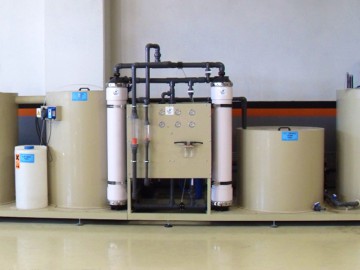U.F.
Ultrafiltration; It is the process in which water is filtered at a macro level by passing it through a semi-permeable surface with the help of parameters such as pressure, force and turbidity. With the membrane technology, the particles that are not dissolved in the water and dissolved in macro degrees are separated from the water.
They can be used instead of existing secondary (coagulation, flocculation, sedimentation) and tertiary filtration (sand filtration and chlorination) systems used in water treatment plants or as stand-alone systems in isolated areas with increasing populations.
An ultrafiltration system is extremely successful at removing particles larger than 0.025 microns. Due to its filtering capacity, it works very efficiently to filter inorganic solids, viruses and bacteria. What an ultrafiltration system cannot do is to extract dissolved minerals as a reverse osmosis system can. So, it's really great at filtering out anything solid, but not so good at separating dissolved solids.
These systems, which are indispensable especially for wastewater recovery, when used together with reverse osmosis systems, help to achieve water yield that can be fed back into the production process.

